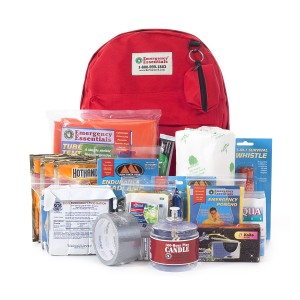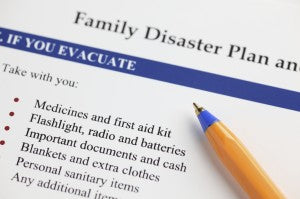We talk a lot on this blog about current events, disasters in progress or recent emergencies. While world events serve to remind us of the importance of proper preparation, by the time catastrophe strikes, it’s too late to prepare. So, assuming you’re not under six feet of snow or facing an oncoming tidal wave at this precise moment, what can you do today to begin prepping for an emergency?
In answer to that question, here are some key initial steps. Or, as we like to call it…
Preparing to prepare.

Depending on where we live and time of year, we all have specific natural disasters that could potentially affect us. And while I’d need to prep a little differently for a flood than you might for an earthquake, there is a common set of first priorities. According to experts, those first priorities boil down to 1)
having a kit, 2)
making a plan, and 3)
informing yourself.
Have a kit. No matter whether you’re cut off by a mudslide or a blizzard has taken out the power, you’re going to need to eat, drink, and stay warm. A basic stash of supplies for the whole family will get you through those crucial first 72 hours. Office organizations like
FEMA, the
Red Cross,
Ready.gov, and even the
CDC offer helpful checklists of what to include in your emergency kit, but all of them include these basics:

- A three-day supply of water, figuring one gallon of water per person per day
- Three days’ worth of food for the whole family
- First aid supplies
- Flashlights and batteries
- Knife, can opener, wrench, or other multifunction tool
- Extra clothing and shoes
- Toiletries
- Medications
- Infant or pet needs
- Blankets
- Cash
- Important documents
Ideally, every member of the family should have their own pack, and packs should be stored somewhere easily accessible. We like the idea of working on these together and keeping a checklist like
this one out where kids can check items off as you acquire them.
Make a plan. There are all sorts of reasons your family may have to evacuate. And as FEMA puts it on the introduction to their fantastic
Basic Preparedness guide, “You plan only once, and are able to apply your plan to all types of hazards.” Begin preparations for bugging out by talking about possible scenarios. And remember, circumstances may require leaving your house or leaving your town! Prep for each eventuality by determining:

- The safest place inside your home to hunker down, as in the case of an earthquake or tornado
- Best escape routes out of the house (have at least two!)
- Two designated meeting points: somewhere close, but clear of your home; and an out-of-town location for larger-scale evacs
- A communication strategy—who will call whom, by what point does everyone need to check in, and how will we reach each other if cell towers are down?
We really like the specific emergency plan templates available at
Ready.gov, or we’ve compiled a comprehensive
Emergency and Evacuation Plan template you can fill in with your specific information and plan.
Inform yourself. To be truthful, this is kind of a catch-all designation. The first two steps will see your family through the initial days of a serious disaster; after that, you’ll have to depend on your knowledge, skills, and ingenuity, which is why education is such a key ingredient to preparation. Pick any one of these areas to start, and build your repertoire of personal resources over time.
- Know which natural disasters are likely in your area, and learn disaster-specific preparation.
- Learn about your community’s notification systems and protocols for emergencies, including schools and hospitals.
- Sign up for local or national text alerts.
- Certify in CPR.
- Learn how to use a fire extinguisher, shut off utilities, and prepare a home for severe weather.
- Organize a neighborhood emergency response team.
- Beef up your survival skills—building a fire, constructing a shelter, cooking outdoors, etc.
FEMA’s guide, mentioned above, is a great, basic starting point. Another treasure trove of information is the
Education section of our website, which includes dozens of resources that will help you prepare for just about anything.
Remember, preparedness is less a state than it is a process. And, like any endeavor, the most important step is the first. Start today with these ideas, and build on your skills and resources as you progress. And don’t forget to keep us posted along the way—what are you doing today to prepare for tomorrow?
 Depending on where we live and time of year, we all have specific natural disasters that could potentially affect us. And while I’d need to prep a little differently for a flood than you might for an earthquake, there is a common set of first priorities. According to experts, those first priorities boil down to 1) having a kit, 2) making a plan, and 3) informing yourself.
Have a kit. No matter whether you’re cut off by a mudslide or a blizzard has taken out the power, you’re going to need to eat, drink, and stay warm. A basic stash of supplies for the whole family will get you through those crucial first 72 hours. Office organizations like FEMA, the Red Cross, Ready.gov, and even the CDC offer helpful checklists of what to include in your emergency kit, but all of them include these basics:
Depending on where we live and time of year, we all have specific natural disasters that could potentially affect us. And while I’d need to prep a little differently for a flood than you might for an earthquake, there is a common set of first priorities. According to experts, those first priorities boil down to 1) having a kit, 2) making a plan, and 3) informing yourself.
Have a kit. No matter whether you’re cut off by a mudslide or a blizzard has taken out the power, you’re going to need to eat, drink, and stay warm. A basic stash of supplies for the whole family will get you through those crucial first 72 hours. Office organizations like FEMA, the Red Cross, Ready.gov, and even the CDC offer helpful checklists of what to include in your emergency kit, but all of them include these basics:




2 comments
JoAnn
Here is my question:
I am mystified and confused on figuring out where our family
would meet, locally + out of town.How do you do that ?
How do you figure that out?
Do you meet at a hotel ? Or in a parking lot a distance from your house ?
Chances are the whole city would be in ruin. (Earthquakes are our concern).
Or if having to leave the city (if possible) would mean the roads + freeways would be jammed up.
We have animals that would not be left behind. They are not allowed in shelters so would that mean we would all live in our SUV ? I have read that they would need to be “placed” some where. How does that work ?
No place would be specically + immediately ready to accept any animal.
If you have any suggestions or answers to any of the questions above I would be ever so grateful.
I did inquire re: the above at the local Firehouse but they had no answers and seemed a bit confused also.
I have done well in preparing to prepare. I still need to fine tune some specific areas, and I’m working on that.
Sometimes I feel like I am building Noah’s Ark because my friends +
family make fun of me.
Terri
I like the fact that you are committed. I’m going to follow your example and become better prepared.
My neighbor was thinking about turning off the power for one weekend, (in secret for safety) and see how your plan and equipment does and doesn’t work. Our family is also going to try this. It may be really important for our special daughter to have this experience too.
Being prepared isn’t silly, it’s choosing to be grown-up and responsible.